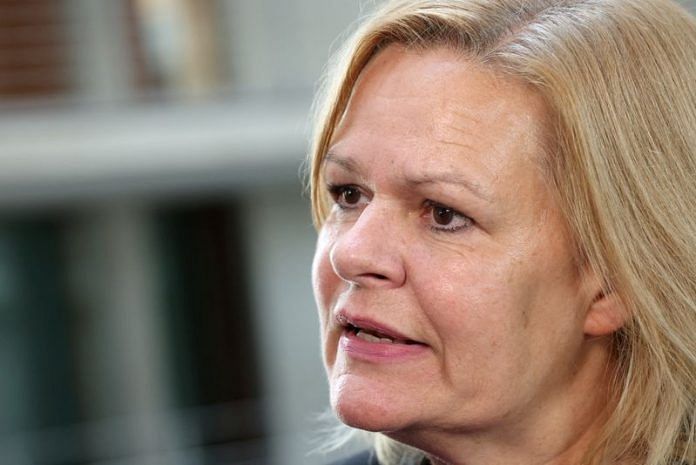BERLIN (Reuters) – German Interior Minister Nancy Faeser on Wednesday vowed to increase penalties for people smugglers as her next step against irregular migration after the cabinet approved measures that simplify the deportation of migrants without a right to stay.
Politicians in Germany, known for its open-door policy during the migration crisis of 2015, have begun looking for ways to curb irregular migration as a way to win over voters ahead of elections next year and as the number of migrants has soared.
The number of people requesting asylum for the first time was up nearly 80% in the first seven months of the year. Federal police say there were 70,753 cases of people entering the country illegally from January to August.
Many of those will have paid people smugglers to reach Europe and cross borders en route, with countries across the continent looking at how to crack down on criminals making money from people fleeing war and poverty.
German federal police said in a report this month that in 2022 some 18,000 people were suspected by border police of being smuggled into Germany, a 10% jump year-on-year.
“I want us to increase the minimum and maximum penalties for smugglers, especially in cases of violent action,” Faeser said, noting the deadly crash of a van carrying migrants in southern Germany this month.
Current rules advise sentences of between three months and 10 years for people smugglers, with the term increasing to between one and 15 years when deaths or violence are involved.
Faeser gave no details of what the proposed new guidelines would be. She said she hoped the cabinet would be able to deal with the matter at the beginning of next month.
German Chancellor Olaf Scholz has also stressed the need to speed up deportations, saying that “far too many” migrants were currently coming to Germany, as state leaders have called for the federal government to take action as they warn that they do not have enough resources for so many people.
The measures also extend detention times for people pending deportation to 28 days from 10, make the deportation of members of criminal organisations easier and crack down on violations of entry and residence bans.
(Reporting by Andreas Rinke and Miranda Murray, Editing by Friederike Heine and Alison Williams)
Disclaimer: This report is auto generated from the Reuters news service. ThePrint holds no responsibilty for its content.



